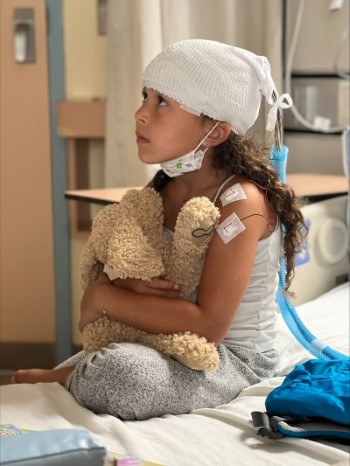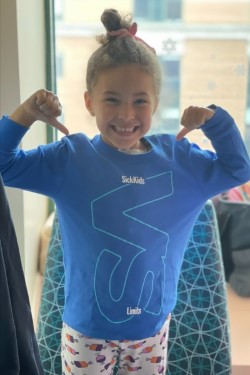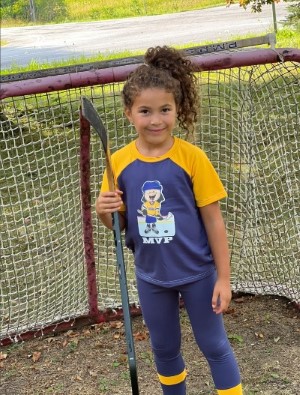From symptoms to diagnosis: Eden's epilepsy story
Summary:
When Eden was four, she was diagnosed with epilepsy at SickKids. For Purple Day, observed annually on March 26, Eden’s mom Andrea shares their experience of receiving an epilepsy diagnosis.
Epilepsy (also known as a seizure disorder) is a brain disorder that makes people more susceptible to having seizures. It is diagnosed when a child experiences unprovoked seizures; seizures that were not triggered by an acute illness, fever or immediate head injury. A sudden electrical disturbance in the brain causes seizures, affecting the individual’s body.
July 30, 2021, was going to be a special Friday night for Andrea Cudmore and her then four-year-old daughter Eden. It marked a fun milestone – Eden was going to see her first movie in a theatre.
Andrea had planned to load up on popcorn and treats for the occasion, but when they arrived at the theatre, Eden didn’t want anything. Halfway through the movie Eden started to complain of a headache and asked to go home. Not thinking much of it at the time, Andrea took Eden home, where she went right to bed.

On August 1, Eden’s symptoms worsened. She complained of a headache and began slurring her words. Andrea took her to their local hospital. On the drive, Eden experienced what is believed to be her first seizure, although at the time Andrea didn’t realize what it was. After arriving at the hospital, Eden had a neurological exam and bloodwork done. They were given an urgent referral to a paediatrician and were sent home. That night, Eden woke up vomiting and had a high fever.
Andrea rushed her to The Hospital for Sick Children (SickKids), where she was admitted. Following a series of tests, including an MRI that showed a cavernoma – a cluster of abnormal blood vessels – in her left temporal lobe, Dr. Jim Dowling, Paediatric Neurologist and Senior Scientist in the Genetics & Genome Biology program at SickKids, diagnosed Eden with epilepsy. Eden started on seizure medication, which she continues to take today. She continues to be closely monitored by SickKids staff, although her visits to the hospital have come less frequent.
“Eden loves seeing her doctors and nurses and we’ve made it to the point where her visits have become enjoyable,” says Andrea.
Since 2008, Purple Day has been held annually on March 26 with the goal of raising public awareness and dispelling misconceptions and fears around epilepsy and seizures.

Finding hope through diagnosis
“I call her my little firecracker,” says Andrea. “She’s just spunky. She’s a very kind, sweet little girl with a mind of her own. She’s just fun to be around.”
Understanding Eden’s diagnosis has allowed her to get back to the activities she loves the most. She loves being active, playing both lacrosse and hockey. She loves spending time with her brother and school friends and her large extended family.
“With the care Eden continues to receive from the staff at SickKids, she is able to live an enjoyable and active life, even with her epilepsy diagnosis.”
Supporting patients and families through their epilepsy journey
The experience of receiving an epilepsy diagnosis looks different for every family. The uniqueness of the experience informs how medical staff at SickKids approach providing an epilepsy diagnosis and subsequent treatment.
“My job is to make sure that I do everything I can to give each child the best chance to have the most meaningful outcomes for them. We know that it’s very scary at first, but we want families to know that there is a lot of support and a lot of hope for very meaningful therapy both now and moving forward into the future,” says Dr. Jim Dowling. “Our jobs as clinicians is to set up a child and their family to be able to do whatever they possibly can, and I don’t put a barrier on what that looks like.”
Families who receive an epilepsy diagnosis at SickKids will then have their ongoing care arranged, either continuing at SickKids or in collaboration with our community partners. At SickKids, we have dedicated nurses, nurse practitioners, social workers, psychologists, dietitians and physicians who are epilepsy experts who support families through this often scary and intimidating process.
While Eden’s epilepsy responded to medication, not all epilepsy cases are alike. Part of the Division of Neurology, the SickKids Comprehensive Epilepsy Program is an interdisciplinary team of neurologists, neurosurgeons, neurophysiologists, nurses and nurse practitioners, neuropsychologists, dietitians, social workers and neuroradiologists. This team provides precision care for complex, drug-resistant epilepsy, including medical, surgical and dietary therapies.

“It’s often a very frightening experience for families, so it’s important that when I approach those first discussions, that I know the family’s understanding about seizures,” says Dowling. “We all want to make sense of the world; we all try to ascribe causality to things that happen. That’s how our brains work, and seizures defy that. Seizures are typically unprovoked, they're unexpected.”
“Epilepsy is a very diverse disorder,” says Dr. Elizabeth Donner, Director of the SickKids Comprehensive Epilepsy Program and Head of Neurology at SickKids. “For many people with epilepsy, seizures are controlled by medication however for more than a third of children with epilepsy, seizures persist. For those children, SickKids offers hope with new treatments and support for families and children.”
Raising awareness through sharing her experience
Andrea says she wanted to share her family’s experience with receiving an epilepsy diagnosis in hopes of improving the public understanding of the illness and illuminating fears around the unknown.
“I think there’s a huge misconception about what epilepsy is. People see the word epilepsy and it’s scary,” says Andrea. “It’s important to get the awareness out there, even if you don’t currently have someone in your life with epilepsy.”
Visit the Epilepsy Learning Hub on AboutKidsHealth for resources on types of epilepsy, how epilepsy is diagnosed, coping with the diagnosis of epilepsy and more.

